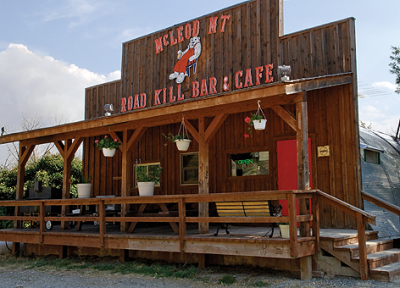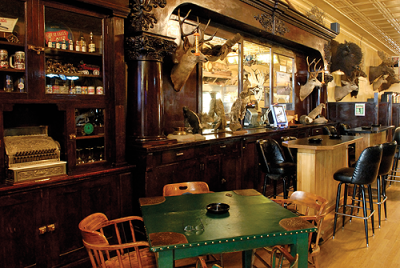Montana's Rural Attractions

Smoke from the summer’s forest fires was thick in Columbus when I pulled up in front of the New Atlas Bar. Still, I took my time before heading inside. I’d done some research, of course, knew of the bar’s reputation as a legendary Montana watering hole. Knew, more specifically, that a dead animal zoo, replete with two-headed calf, hung on the walls. Knew, in addition, that Calamity Jane is rumored to have galloped over from her cabin north of Laurel to deal Faro in the years before it became the “New” Atlas. I suppose I was preparing myself for the embrace of reality as opposed to the arm’s length of research. I didn’t, after all, want to embarrass myself by spooking like Ty Wilcox’s horse.
One Saturday night, not so long ago, Ty Wilcox spurred his horse into the bar. His cayuse took one look at the dead critters hanging on the walls and, thinking perhaps that an equine was needed to complete the menagerie, did a skittering one eighty and bolted back out the door. It was all poor Ty could do to keep from getting his head knocked off as they went lunging and flapping out into the street.
As it turns out, my mental preparation was a waste of time. The critters were dusty, the patrons were friendly and the owners on hand—Lars and Jami Swanson, along with Lars’ sister Dana Burchell—sat me down at one of the antique Brunswick bars and made me feel right at home.
Nine years ago, Lars, Dana and their mother, Mickey Barrett, purchased the New Atlas from T.P. Mulvihill’s estate. T.P. inherited it from his father, Tom, but gave it over to be managed by Gary Wegner, who kept the place jumping until T.P.’s death. Established by Tom in the 1890’s, the bar was shut down during prohibition, but reopened after that incomprehensible act was repealed and moved to its present location. Thus, “New” Atlas Bar.
Although the New Atlas depends for its livelihood on the locals—the farmers, ranchers, construction workers and truckers who call Columbus home — even Mel Gibson and Michael Keaton have bellied up to the bar. Dave Barry stopped by and wrote about encountering folk wearing “dirt-intensive western-style clothing that was not manufactured by Ralph Lauren.” And then there’s the tourists, from both America and abroad. While the locals drop in for the camaraderie and the alcohol, the outlanders come for the wall hangings and the tales.
Besides the two-headed calf, which nursed from a pair of bottles, a full mount of one of the last wolves taken in the territory stands on the eastern wall. A lady rancher roped the wolf, while the albino fawn, which stands rather daintily in a glass case all its own, was mistaken for a goat and shot by a cranky rancher tired of his neighbor’s livestock poaching his grass. The buffalo is not, however, a native Montanan. Shot on an island in The Great Salt Lake, the buffalo was eventually shipped to Columbus by a New York City dentist. The dentist had visited the New Atlas and realized that the bar would be a livelier retirement home for the old buff than his dour Manhattan office.
One of Lars’ favorite tales (bolstered by a fragile newspaper clipping) is how Ty Cobb had to pony up for beer and steaks. Seems Ty’s traveling baseball team was whipped by the Columbus team (coached by Dudley Crane, brother of Steven Crane), and to save his reputation Ty bought beer and steaks in exchange for a promise never to reveal his humiliation.
An upstairs cathouse is rumored to have rattled the pressed tin ceiling, while bulls were once led into the back room and auctioned off in an atmosphere where a fellow could quench his thirst. The bar’s first robbery was so long ago that even Bill Phares, who’s old as rope, doesn’t remember it all that well, but during the second robbery a pair of armed men tied up the bartender and three patrons and rifled the safe. Apparently the crooks had never worked as cowboys or sailed the seven seas, because the captives untied themselves and peeked out the door as the robbers made their getaway. The would-be captives described the vehicle to the Highway Patrol who apprehended the owl hoots just down the road.
It would be a mistake, however, to think of the New Atlas as stuck in the past. Horse and rider still clomp in for a snort, and recently Mike Davey broke his leg after tripping over a jar of pickled eggs while dancing on the bar. Frozen pizza (the alpha and the omega of the menu) has found a niche among the jars of concoctions, and the back room where bulls once roamed houses a coin-operated pool table and electronic dart boards. Between gigs in Deadwood South Dakota and the Huntley Lodge, Dianne Gleason, a Calamity Jane impersonator of some renown, has dealt cards in the refurbished poker room.
Speaking of a Calamity Jane impersonator gets me to thinking about Calamity Jane, and that gets me to musing over the vagaries of history. Nowadays there’s a narrow room up by the front door where the neon and dinging gambling machines live. Back in the bygones, however, women were confined to that narrow room and forced to buzz for service. Now I know that Calamity Jane was never in the “New” Atlas, but I can’t help wondering what might have happened if history had stacked up a little differently? If Calamity Jane, for instance, and that narrow room had collided? Perhaps that narrow room would have been turned to kindling. Perhaps the maiming of a bartender or two would have been added to this great old bar’s storied past.

If there was smoke in Columbus, there was evidence of fire on the Boulder Road to McLeod. A dozen miles south of Big Timber I passed a massive yellow bulldozer that had gouged firebreaks across the land, and shortly blackened sweeps of the Boulder Valley were licking right down to the road. Two dozen homes had been lost, the area had been evacuated and the people of McLeod had only just returned when I pulled up in front of the Road Kill Bar & Cafe. As if the great plumes of dirty smoke billowing in the distance weren’t evidence enough of the lingering danger, half a dozen yellow-shirted firefighters were poring over a map spread on the hood of a truck.
Inside, however, the mood was upbeat. The only watering hole within fifteen miles was open. The residents were back, even if they were living out of their vehicles in anticipation of a shift in the wind. And a couple of out-of-state fishermen were watching the New Orleans Saints beat up the Cleveland Browns. My blue jeans had barely met a bar stool before Mike—an amicable part-time bartender, part-time fishing guide—had his scrapbook out and we were flipping through photographs of lake trout and northern taken in central Saskatchewan. Later, while I looked over a handwritten menu that includes shrimp, crab legs, the McLeod sirloin and the infamous Road Kill Burger, Mike tramped off to get the mother and son team who own and operate the Road Kill Bar & Cafe.
Since Will and Ginger Grundhauser purchased the Road Kill less than two years ago, I thought I’d ask about the transition. They got a big kick out of that. The transition was pretty doggone easy, what with the patrons being quick to inform the Grundhausers of the way things work. “From your grille to ours,” the Road Kill motto, must remain, of course. So, too, the photograph of a visiting Brooke Shields with her smile like a box of chalk, and the tiny turquoise sink in the ladies room is practically sacrosanct. Dancing on the bar is required, the regulars assured them, and eight ball must be played according to McLeod rules. Said rules are posted over the pool table and, while rules one and two are the fairly common, number three states that should the cue ball or cue stick hit the floor in the course of a game you must provide money for the jukebox.
Some Road Kill traditions, however, cut deeper than the quirky or droll. The moose rack that hangs between the bar and dining room will hang there until the bar turns to dust. David Martin, son of Road Kill founders, Cliff and Florence Martin, shot that moose.
David was killed in Vietnam….
Cliff and Florence established the Road Kill just after World War 2, but moved it in the mid-fifties from the town of McLeod to its present location, a quarter mile down the road. It was at the new location that Cliff brought his thrifty talents to bear.
To cool the Road Kill—a sizeable Quonset hut with squared sides and a false front—Cliff buried hot water heater cores beneath the building, ran cold water through their guts and forced the cooled air into the bar. To provide heat, he tossed hundreds of steel beer cans into a fire, burned them black and filled the cans with stones to create an early and inexpensive solar heating system. Which is not to say that Cliff’s jury-rigged solar outfit can handle a Montana winter. Backup is provided by a furnace in the sub-basement that gobbles blocks of wood a couple of feet in diameter.
Clint sandwiched a roomy apartment between the sub-basement and the bar and, out behind the Road Kill proper, half a dozen RV hookups have been arranged in sight of the Road Kill Cabin. Ginger lives in the apartment, Will lives on first floor of the cabin, and the second floor has been given over to a bunkhouse where tipsy patrons are encouraged to spend the night.
It’s little things like that bunkhouse for tipsy patrons and the families that gather for dinner that make the Road Kill Bar & Café something of a community center for the people of the Boulder Valley. Cats and dogs roam the bar, Sunday afternoon football is well attended and loud, and generations of local children have learned to shoot pool beneath the flickering neon signs. Late at night, however, after the children have been put to bed and the dogs are asleep on the floor, the adults come out to play. Stewart Stanberg might instigate the dancing on the bar, Jim Ellison might set the bar stool racing in motion, while in the background, Clint Carter, affectionately known as “the mouth of the south,” will be rambling all night long.
Occasionally the Road Kill features live music, a DJ or karaoke, and if the four wheelers aren’t playing bumper cars out there, Will and Ginger might barbecue on the porch. Finally, there’s the possibility of an iced T-shirt contest. The T-shirts are soaked in water, balled up and frozen. At a signal from the bartender or other sanctioned official, each participant must uncrinkle the T-shirt and yank it over his or her head. And that reminds me of the Road Kill’s other motto, which Will and Ginger mentioned as I ate a Reuben sandwich that rivals anything I’ve tasted in Chicago or Denver.
“What happens on the Boulder,” they pointed out (with an impish twinkle in their eyes), “stays on the Boulder.”
~ Since leaving Montana PBS, where Bilverstone made an award-winning performance piece and documentaries about Ernest Hemingway and Dorothy M. Johnson, Bill Bilverstone has spent a year photographing and writing about a small, relatively coherent group of homeless folk and generally living the glamorous life of a Montana freelancer.
Leave a Comment Here
Leave a Comment Here